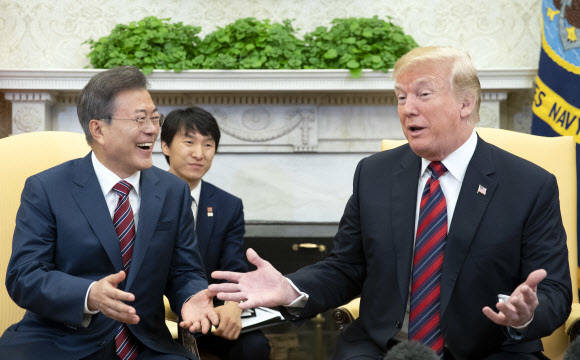 |
|
South Korean President Moon Jae-in and US President Donald Trump during their summit at the White House on May 22, 2018. (Yonhap News)
|
Trump softens message toward N. Korea by emphasizing relationship with Kim Jong-un
Over the past few days, the US government under President Donald Trump has paired the tough message that it won’t lift sanctions against North Korea with the promise to keep up momentum in dialogue with the North. Considering that there is still strong demand in the US for a roadmap that would include the final stage of denuclearization, the next question is whether the South Korea-US summit on Apr. 11 will produce a plan for resuming North Korea-US dialogue, which is currently at a standstill. During an annual meeting of the Republican Jewish Coalition in Las Vegas on Apr. 6, Trump said that the US is getting along well with North Korea and that they have a good relationship. But referring to the second North Korea-US summit, Trump said he’d had no choice but to walk away from the only deal that was offered, explaining that it wasn’t the right deal. These remarks appear to show that Trump means to bring North Korea back to the negotiating table by emphasizing his relationship with North Korean leader Kim Jong-un, while also putting pressure on the North to go beyond the shutdown of the Yongbyon nuclear complex offered by Kim during the Hanoi summit and to take steps to carry out full denuclearization. When US Secretary of State Mike Pompeo was asked during an interview with CBS This Morning on Apr. 5 if there would be a third North Korea-US summit, Pompeo said, “I’m confident there will be.” But when the host asked if the US would agree to partially ease economic sanctions to sustain the momentum of dialogue with the North during its summit with South Korea, Pompeo said, “Our administration’s policy is incredibly clear: Economic sanctions, United Nations Security Council sanctions, will not be lifted until we achieve the ultimate objective that we set out now almost two years ago.” The host pressed Pompeo further, asking if the US was going to say no to South Korea, which has been pushing for sanctions to be eased on the Kaesong Industrial Complex and North Korea tourism, but Pompeo dodged a direct response, only saying, “I talk to my South Korean counterpart a lot,” referring to South Korean Foreign Minister Kang Kyung-wha. There had been some speculation that one of the ideas South Korean President Moon Jae-in might float in his meeting with Trump on Apr. 11 is using inter-Korean economic cooperation, including the resumption of operations at the Kaesong Complex and tourism to Mt. Kumgang, as an incentive for North Korea to denuclearize, but the Americans have in effect already shot that down. “It’s clear that the US hopes to quickly resume dialogue with North Korea. But it’s even more determined to maintain sanctions on the North than it was before the Hanoi summit,” said a South Korean government source who is familiar with the North Korea-US negotiations. This source also said that the US’ position is that future negotiations “must at least produce a roadmap” toward denuclearization. This suggests that Kim Jong-un’s reluctance to discuss denuclearization measures beyond the Yongbyon facility and his strong push for partial sanctions relief during the Hanoi summit has made the US more confident in the validity of its sanctions on the North and on the necessity of a roadmap. This also suggests that Moon has his work cut out for him if he wants to persuade the US to adopt a flexible attitude. By Kim Ji-eun, staff reporter Please direct comments or questions to [english@hani.co.kr]






